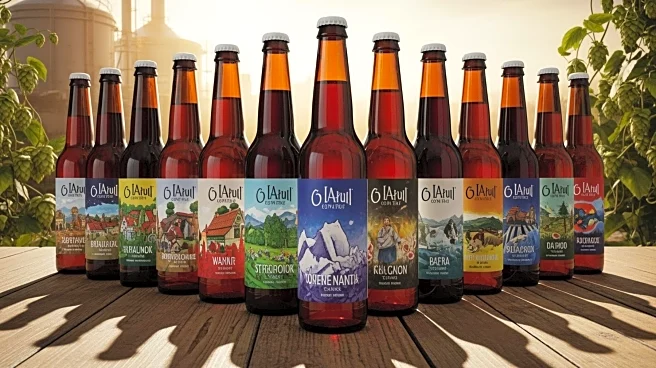What's Happening?
Recent research from the University of Illinois Urbana-Champaign highlights the potential impact of tariffs on the U.S. beer market, valued at $117 billion. The study, led by agricultural economist Aaron Staples, examines how tariffs could affect domestic
beer production costs and consumer prices. Tariffs on inputs like malt, hops, steel, and aluminum could increase production costs for domestic beer, potentially leading to higher prices for consumers. The research indicates that while tariffs might stimulate domestic production, the benefits would likely favor multinational firms over small craft breweries. The study also notes that the U.S. market share for imported beer has grown significantly, with Mexico accounting for a large portion of imports. Tariffs on aluminum content in imported beer could lead to higher retail prices, affecting consumer purchasing behavior.
Why It's Important?
The implications of tariffs on the beer industry are significant, as they could lead to increased costs for consumers and impact market dynamics. Small craft breweries, which are vital to local economies, may struggle with higher production costs due to their limited economies of scale. This could result in reduced market share for these businesses, while multinational firms might benefit from increased domestic production. The potential rise in beer prices could decrease consumer welfare, with estimates ranging from $53.1 million to $306.4 million in losses. Additionally, tariffs could lead to a reduction in product variety if international brands find it unprofitable to continue U.S. distribution. The situation underscores the broader economic impact of tariffs on consumer goods and local businesses.
What's Next?
The beer industry may see shifts in business strategies, with multinational firms investing in new production facilities and marketing their products as 'American made.' Craft brewers might face challenges in absorbing increased costs, potentially leading to higher prices for consumers. The legality of certain tariffs is under scrutiny, adding uncertainty to the market. As tariffs continue to be a central policy issue, stakeholders in the beer industry will need to navigate these changes and adapt to evolving market conditions. The long-term effects on consumer prices and market share distribution remain to be seen.
Beyond the Headlines
The impact of tariffs on the beer industry highlights broader economic and policy challenges. The situation raises questions about the balance between protecting domestic industries and supporting small businesses. It also points to the potential for increased consumer costs and reduced product variety, which could affect consumer choice and satisfaction. The evolving landscape may prompt discussions on trade policy and its implications for various sectors, including agriculture and manufacturing.















